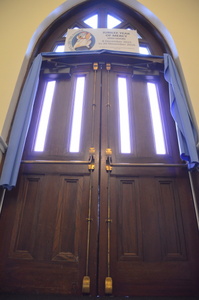From the Bishop - January 2017

With these words, we brought the Jubilee Year of Mercy to a close in our cathedral in Portland on the Feast of Christ the King. As we look back, we can see that the year was truly a grace and an opportunity to rediscover the ways we might work together to heal our world with mercy. In calling for this Holy Year, Pope Francis asked us to reflect on the need for an appreciation of mercy. He wanted us to be able to see mercy as “the beating heart of the Gospel.” It is the central reason that Jesus Christ became “the face of the Father’s mercy.” God wants us to experience His mercy, His compassion, and forgiveness, and to bring it into the lives of others.
The first place in which we experience mercy is in our own lives. Jesus turns us from sinners into saints. We find his mercy in the sacrament of reconciliation. We are forgiven our sins. We are sent forth, then, to live in God’s mercy.
And, certainly, we have had many opportunities to bring God’s mercy into our world. We have done this by revisiting the corporal and spiritual works of mercy. We have rediscovered in these acts of mercy ways to be present to the needs of others. Together, we visited prisoners, assuring them of God’s care for them. Our young people from schools and faith formation programs worked together to collect warm clothing for those who go without. We clothed the naked. We blessed the fields in Aroostook County which would provide food to the pantries of the county and the state to help those with insufficient nourishment. We fed the hungry. We celebrated the diversity of our immigrant Catholic community here in Portland. We welcomed the stranger. We honored teachers who bring knowledge of our faith to young people. We counselled the ignorant. We prayed for the dead and reminded each other of God’s eternal mercy.
These are some of the things we did together as a diocese. There were, as well, numerous acts of mercy happening in our parishes all over the diocese. As the jubilee year was coming to a close, I was thinking that so much good had been accomplished that it was a shame the year could not be extended. And, just at that moment, Pope Francis published a new letter in which he reminded us that the mercy, which was the heart of the jubilee, “must continue to be celebrated and lived out in our communities.” Mercy, he reminded us, constitutes the very existence of the Church (cf. Misericordia et Misera, n. 1). And, now, as we conclude this Year of Mercy, it is time to look to the future and determine how we can continue to experience and share the richness of divine mercy (n. 5). The message of mercy does not end with the close of the Year of Mercy. The forgiveness we receive, the projects and acts of mercy we share with others, they continue; they are a part of who we are as Christians.
In a beautiful gesture of mercy, as if to show the bounty of God’s care for His people, Pope Francis ended the year with an exceptional decision in which he granted to all priests throughout the world the special faculty to absolve those who have committed the sin of abortion. He restated firmly, so that there would be no confusion, that “abortion is a grave sin, since it puts an end to an innocent life” (n. 12). By granting this special provision, Pope Francis wanted to make clear “that there is no sin that God’s mercy cannot reach and wipe away when it finds a repentant heart seeking to be reconciled with the Father” (n.12).
Lest there be any misunderstanding about this action of the pope, it should be noted that this permission both to forgive the sin of abortion and to remove the penalty of excommunication that can be incurred with the sin has been given to all priests ministering in the Diocese of Portland for many years. Anyone who has received forgiveness in the past should not fear that anything is changed by this action of Pope Francis. Once forgiven, the sin is forgiven. This is our belief regarding the mercy of God. Moreover, in helping those who have participated in an abortion to seek solace and further care, the Diocese of Portland offers Project Rachel, the Church’s post-abortion healing ministry, which offers assistance to those suffering from the loss of a child by abortion. This has brought great comfort to many. It is another way in which we can bring God’s mercy to one who needs it.
“Be merciful, just as your heavenly Father is merciful.” As we look back in gratitude for the grace of this jubilee, may we continue to seek ways to live these words of Jesus.
Most Rev. Robert P. Deeley, J.C.D.
12th Bishop of Portland










